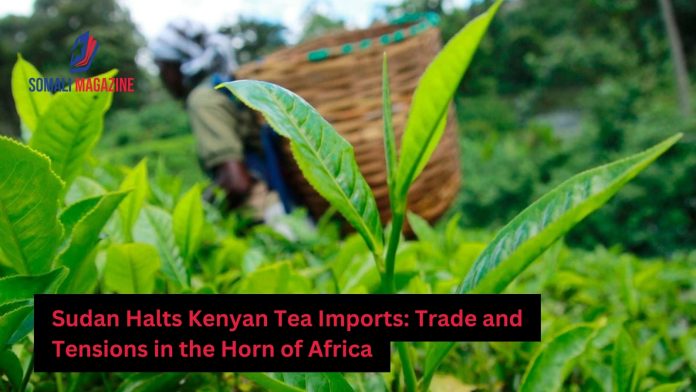Facebook Twitter Instagram Somali Magazine - People's Magazine
The purchase of Kenyan tea in Sudan has sharply declined as ongoing conflict and political tensions in the Horn of Africa disrupt trade relations. The Sudanese government recently announced a suspension of all imports from Kenya, citing Nairobi’s alleged support for the Rapid Support Forces (RSF), a paramilitary group engaged in a brutal civil war with Sudan’s military since April 2023. This decision has sent shockwaves through Kenya’s tea industry, which heavily relies on Sudan as one of its key export markets.
The suspension, effective immediately, was declared by Sudan’s Ministry of Trade and Supply as a measure to safeguard national security and protest Kenya’s perceived alignment with the RSF. Sudan’s military government accused Kenya of hosting RSF leaders and facilitating their activities, a move it described as hostile to Sudan’s sovereignty. The ban extends to all Kenyan goods, including tea, coffee, and other products, effectively halting trade through ports, airports, and land borders.
Kenya’s tea industry, which accounts for 80% of the teas traded through the Port of Mombasa, is already feeling the impact of Sudan’s decision. Sudan has historically been a significant consumer of Kenyan tea, with imports valued at $37 million in 2022. However, this figure dropped to $18 million in 2024 due to the ongoing conflict in Sudan. The latest ban threatens to further erode this market, leaving Kenyan exporters and smallholder farmers grappling with financial losses.
The East African Tea Trade Association (EATTA) has raised alarm over the economic repercussions of the suspension. Large volumes of tea destined for Sudan are now stranded in warehouses and at sea, with exporters unable to fulfill contracts or receive payments. EATTA Managing Director George Omuga revealed that over 2,000 containers of tea remain stuck at the Port of Mombasa, while others are held at Port Sudan. “This will result in immense losses for buyers, producers, and farmers,” Omuga warned, calling on the Kenyan government to engage Sudanese authorities and secure a one-month window to clear existing shipments.

The diplomatic fallout between Kenya and Sudan adds another layer of complexity to the already volatile situation in the Horn of Africa. The region has been plagued by conflict, economic instability, and humanitarian crises, with Sudan’s civil war displacing millions and claiming over 30,000 lives. Kenya’s alleged support for the RSF has further strained relations, prompting Sudan to use trade as a tool to express its discontent.
Kenyan officials have denied backing the RSF and urged Sudanese factions to pursue dialogue and a political solution to the conflict. However, the suspension of tea imports underscores the broader challenges facing regional trade and diplomacy. Sudan’s decision not only disrupts Kenya’s tea industry but also risks driving up prices for Sudanese consumers, who rely on Kenyan tea as a staple product.
The Horn of Africa’s instability has also affected other key markets for Kenyan tea, including Pakistan, Iran, and Iraq, where economic and security issues have dampened demand. Despite these challenges, Kenya’s tea sector recorded $1.65 billion in earnings in 2024, a 9% increase from the previous year. However, industry players warn that losing Sudan as a top-five export market could deal a significant blow to the sector.
As tensions escalate, the focus remains on finding a diplomatic resolution to the trade impasse. Kenyan tea exporters are calling for urgent government intervention to protect the livelihoods of thousands of farmers and traders who depend on the industry. Meanwhile, regional leaders and international organizations are urging Sudan and Kenya to prioritize dialogue and cooperation to address the underlying issues fueling the conflict.
The suspension of Kenyan tea imports by Sudan highlights the intricate link between trade and geopolitics in the Horn of Africa. As the region grapples with multiple crises, the need for stability and collaboration has never been more urgent.

